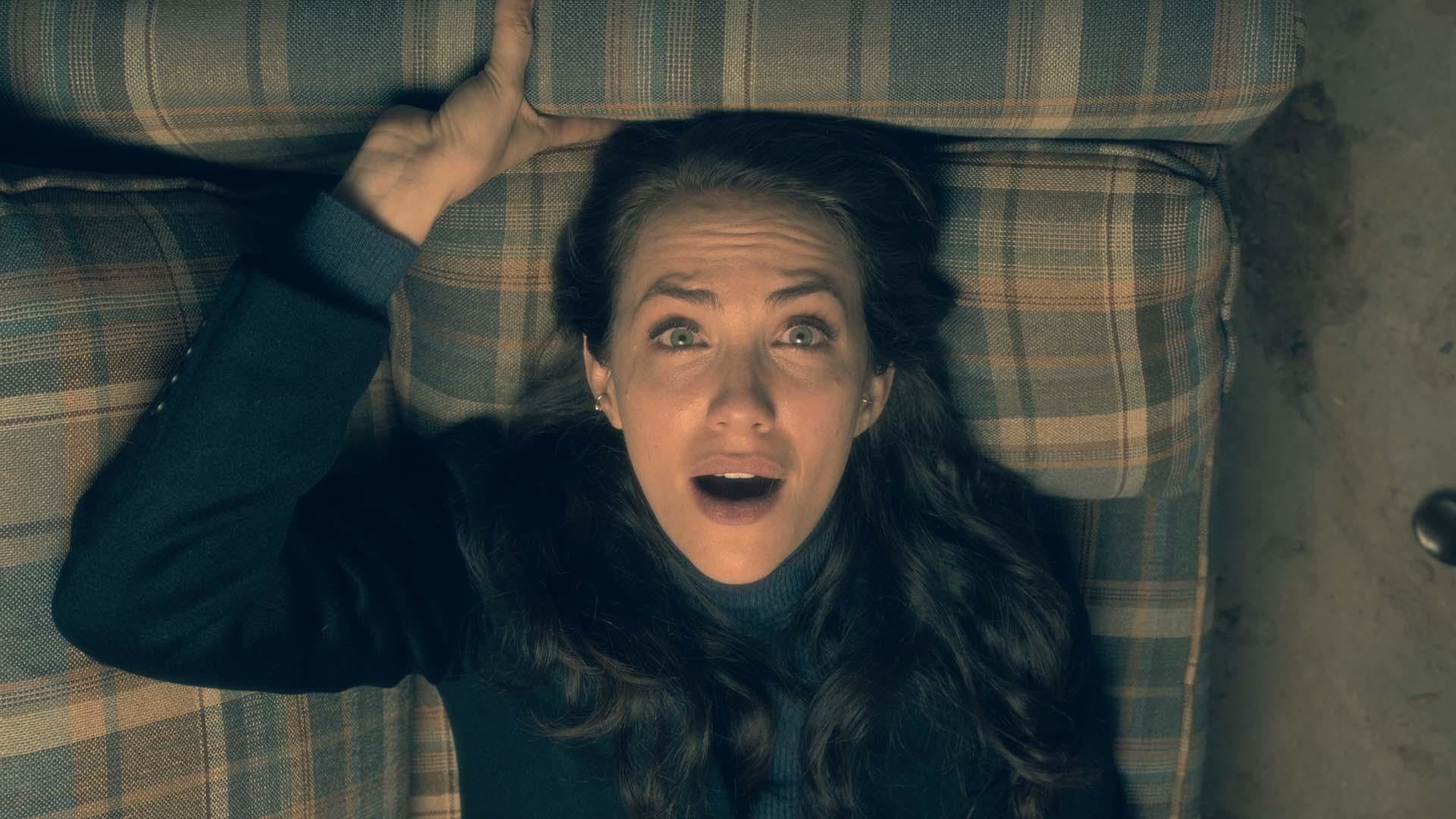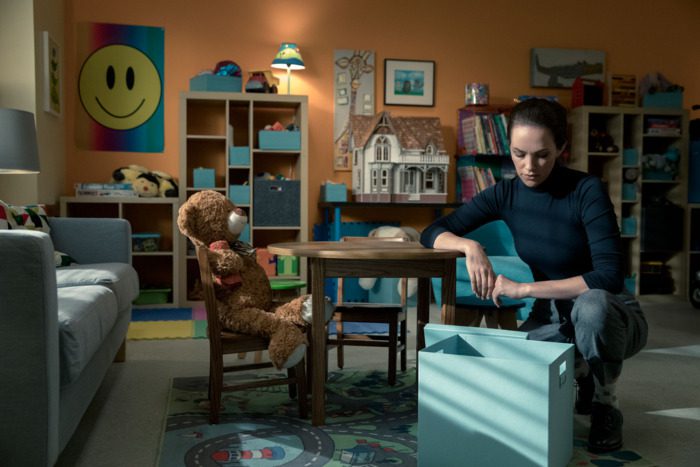“Touch,” the third episode of The Haunting of Hill House, begins with a skin-crawlingly great cold open. Theo lies in bed and Nell comes to join her. Theo assumes her sister has had a nightmare, and allows her into bed. Nell laces her fingers between Theo’s, squeezing tight – too tight. Theo turns on the light and rolls over to talk to Nell, only to find that she is alone in the bed. “Whose hand was I holding?” she wonders aloud. Like the rest of the show, it is a version of what transpires in Shirley Jackson’s magnificent novel. Mike Flanagan’s version of Hill House is less of an adaptation, and more of an interpretation; at times it borders on ekphrasis, the act of art responding to other art. This has turned some people off of the show, but I consider it a stroke of genius. Flanagan has crafted a wrenching family drama without any of the treacly sentimentality of This Is Us; at certain points during “Touch” (and other episodes of Hill House, to be fair), I wondered what was compelling me to continue watching. Combining horror with any other genre is exceedingly difficult, and Flanagan could have fallen on his face with a ten-hour Gothic family drama. But Flanagan is flat-out an amazing director, just one who has chosen horror as his milieu.
Flanagan’s hand on the tiller is so steady throughout Hill House that no matter how much I enjoyed spending time with Steven or Shirley, I was just as excited to learn more about Theo. Theodora Crain is one of the show’s biggest mystery, and in her insulating gloves and turtlenecks, she’s the most visually dynamic character in the cast. Kate Siegel (excellent in Flanagan’s Hush) plays Theo with a tough detachment that does little to belie the warmth and compassion that define her. Theo places a lot of importance on self-reliance, safety, independence, and strength, and one thinks that this is what gave rise to her germaphobia, but that turns out to be a feint. She doesn’t wear the gloves because she’s afraid of germs; she wears them because in a cast of characters with no shortage of feelings, she feels the most, and the most intensely.
This is all keeping in line with Jackson’s representation of the character (Flanagan might deviate from his source material, but he never ignores it). Theo is an extraordinarily empathetic character, so much so that she wears the gloves to avoid touching anything that could trigger one of her visions or insights. We see this at play when she’s young, first finding an expensive bottle of wine, then later declaring that “the whole house is cold” (cue the insulating sweaters).
On a side note, the scene where she affirms the existence of a cold patch does wonders to complicate Mrs. Dudley’s character. Annabeth Gish does wonders with her one scene in “Touch” – we wonder at first if Mrs. Dudley is in some kind of thrall to the house, and is covering for it by denying the cold spot’s existence, or if she knows the house so initmately that she’s trying to protect the Crains. The latter would also explain why Mr. Dudley insists he doesn’t have a key that will open the red room. Mrs. Dudley’s outspoken faith is not just a character trait, it’s a core facet of her being, and you get the sense – in one scene, remember – that she and her husband consider themselves to be extensions of the house, but also guardians of those who enter it. Obviously this is a refreshingly new spin on the one-dimensional harbingers of doom we saw in 1999’s The Haunting.
“Touch” is, it should be noted, Hill House‘s scariest episode so far. Theo’s patient Kelsey speaks of a monster called Mr. Smiley (“He’s always smiling, but he isn’t really happy”), and at this point, Flanagan knows he has us squirming in our seats until we see it. (Mr. Smiley is on screen only briefly, but it’s hellishly effective.) The episode’s coup de grace comes when Luke rides the dumbwaiter down to the basement. Trapped inside with a failing flashlight, he sees some manner of ghoul approaching him from across the room. Flanagan excels at maintaining tension, and we get two or three glimpses of the ghoul before seeing it in its entirety. There are no jump scares. If there’s one thing that bothers me so far about The Haunting of Hill House, it’s that there isn’t really any rhyme or reason to its monsters. What do the basement ghoul and Theo’s nighttime visitor have in common? What are the rules of the dead in this world? I’ll watch whatever Flanagan dishes up, but there are moments when I feel unmoored.
The sly trick that Flanagan pulls with Hill House is making you guess which of these characters is the emotional anchor of the show. Each episode makes a case for its focus character. I’m willing to say that it’s Theo, though. So much of horror can be cold, and occasionally that works, like in The Shining. But in Jackson’s novel, and this adaptation thereof, coldness doesn’t suit the material. Theo puts forth an aloof, casual persona, but she feels so much and so deeply that she has to protect herself against it. In that way, she doesn’t represent the show; she is the show. There’s a nice bit of synergy to Siegel’s casting in that case – she’s married to Flanagan, and it’s sweet that she’s essentially playing the story’s avatar of love and emotion (I’m not accusing anyone of nepotism; Siegel is a terrific actress who should have a much bigger career). Theo is the beating heart of The Haunting of Hill House, and episodes like “Touch,” while uneven at times, really raise the stakes.
4/5
A Few Thoughts
- Line reading of the episode/show so far: “I’m gonna get my fucking PhD.”
- I didn’t talk much about the actual narrative thrust of the episode, but I found it extremely clever and sad. Mr. Smiley is a warped piece of wood, but he’s also so much worse.
- McKenna Grace, as the young Theo, really shines here, and her performance is nicely in conversation with Siegel’s. Grace’s empathetic eyes really sell moments like Theo picking up the scrap of Luke’s shirt and whispering, “You were so scared.”
- Another great moment: Theo telling Shirley what to tell her kids about Nell’s death. Shirley repeats it almost verbatim in “Open Casket.”


